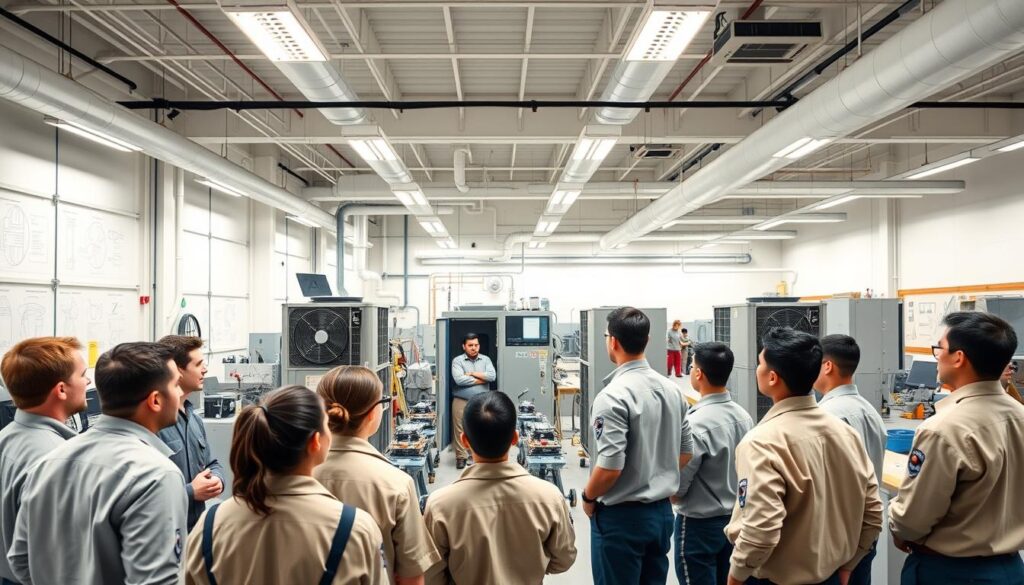Affiliate Disclosure
HVAC Guide Guys is a participant in the Amazon Services LLC Associates Program, an affiliate advertising program designed to provide a means for sites to earn advertising fees by advertising and linking to Amazon.
How Long Does It Take to Learn HVAC? Ever thought about switching to a career in HVAC? It might be quicker and more rewarding than you imagine. Knowing how long it takes to learn HVAC can help you plan your career path.

HVAC training can take different amounts of time, depending on your choice. You could get a certificate in about 9 months or an associate degree in up to 3 years.
Several things affect how long you’ll take to learn HVAC. These include the type of program, any certifications needed, and how hard you work. With more people needing HVAC services, this career is looking very promising.
Key Takeaways
- HVAC training programs range from 6 months to 3 years
- Certificate programs can be completed in approximately 9 months
- Associate degrees typically require 2-3 years of study
- Apprenticeships may take 3-5 years for full certification
- Continuous learning is essential in the evolving HVAC industry
Table of Contents
Understanding the Modern HVAC Industry Landscape
The HVAC industry is changing fast, affecting your career path and learning time. New technologies are changing how we work with heating, ventilation, and air conditioning systems.
For those starting in HVAC, the future looks bright. New trends open up many ways to grow and learn new skills.
Current Industry Trends and Developments
- Smart home integration with advanced HVAC systems
- Green energy and sustainable cooling technologies
- AI-driven predictive maintenance solutions
- Internet of Things (IoT) enabled climate control
Market Growth and Opportunities
The U.S. Bureau of Labor Statistics says HVAC technician jobs will grow by 9% from 2023 to 2033. This means big opportunities for those who invest in their training.
| Career Path | Training Duration | Potential Growth |
|---|---|---|
| Certificate Program | 6-12 months | Entry-level positions |
| Associate Degree | 2 years | Advanced technical roles |
| Apprenticeship | 3-5 years | Specialized expertise |
Technological Advancements in HVAC
Learning about new technologies will be key in your HVAC career. Modern HVAC systems now use:
- Advanced digital control systems
- Energy-efficient refrigeration techniques
- Automated diagnostic tools
- Renewable energy integration
Staying up-to-date is essential in this fast-changing field. It helps technicians stay ahead and flexible.
Explore Our HVAC Shop
Looking for top-rated HVAC tools, parts, and accessories? Visit our shop and find the perfect solution for your needs.
Visit the ShopCareer Prospects and Salary Expectations in HVAC
The HVAC industry offers exciting career paths for skilled workers. Your journey in HVAC can greatly affect your salary and job chances. The U.S. Bureau of Labor Statistics shows great opportunities in this field.
How much you earn depends on your education and skills in HVAC. Here’s what you might make:
- Entry-level jobs start at $37,000 a year
- The average salary is $57,300 a year
- Top technicians can earn up to $84,000 a year
Some of the best places for HVAC jobs are:
- Colorado
- Connecticut
- Maryland
- New Jersey
- Texas
The job outlook is very good. The Bureau of Labor Statistics predicts about 37,700 HVAC job openings each year until 2032. With a 6% growth rate, your HVAC training could lead to a rewarding career.
Benefits like health insurance and overtime pay are common. Getting more training and certifications can also increase your salary and career growth.
Explore Our HVAC Shop
Looking for top-rated HVAC tools, parts, and accessories? Visit our shop and find the perfect solution for your needs.
Visit the ShopEssential Education Requirements for HVAC Technicians
Starting a career in HVAC needs careful planning. Your hvac certification timeline is key to getting into the field fast. There are different training paths, each with its own benefits for growing your skills.
There are many ways to become an HVAC technician. Each path has its own perks and prepares you for a career in climate control.
Technical School Programs
Technical schools offer intense training for HVAC pros. These programs include:
- Comprehensive hands-on training
- Specialized coursework in system maintenance
- Practical skills development
- Shorter completion times (6-24 months)
Community College Options
Community colleges provide structured HVAC education with extra benefits:
- Associate degree programs
- More affordable tuition rates
- Broader educational foundation
- Typically 2-year curriculum
Online Training Possibilities
Digital learning platforms offer flexible HVAC training for those with busy schedules:
- Self-paced learning modules
- Interactive virtual labs
- Convenient scheduling
- Lower overall costs
Your chosen path will greatly affect your hvac certification timeline and career. Think carefully about each option to find the best match for your goals.
Explore Our HVAC Shop
Looking for top-rated HVAC tools, parts, and accessories? Visit our shop and find the perfect solution for your needs.
Visit the ShopHow Long Does It Take to Learn HVAC

Figuring out how long it takes to master HVAC is key for those thinking about this career. The time needed to learn HVAC changes a lot. It depends on your education path and career goals.
The usual time to become an HVAC pro can be from 6 months to 5 years. Here’s a look at different training paths:
- Certificate Programs: 6-12 months
- Fastest way to start working
- Teaches basic technical skills
- Associate Degree Programs: 2 years
- Deeper technical education
- Covers advanced system design and upkeep
- Apprenticeship Programs: 3-5 years
- Combines classroom learning with hands-on experience
- Includes about 600 classroom hours
Remember, learning HVAC is an ongoing process. The first training is just the start. Modern HVAC systems are getting more complex. You’ll need to keep learning new skills throughout your career.
The US Bureau of Labor Statistics says HVAC jobs will grow 5% from 2021 to 2031. This shows great job prospects for skilled technicians.
Your learning time will vary based on several things. These include how intense the program is, your natural ability, and any extra certifications you get. Some people finish basic training in months. Others spend years to become true HVAC experts.
Required Certifications and Licenses
Understanding HVAC certifications is key for your career. Different certifications and licenses show your skills and knowledge in the HVAC field.
Your HVAC certification timeline includes important credentials. Knowing these will guide you to a successful HVAC career.
EPA Section 608 Certification
The EPA requires Section 608 Certification for technicians working with refrigerants. This certification has several exam types:
- Core exam (mandatory for all technicians)
- Type I exam for small appliances
- Type II exam for high-pressure appliances
- Type III exam for low-pressure appliances
NATE Certification
NATE certification is optional but highly valued in the HVAC field. It proves your technical abilities and boosts your professional reputation.
State-Specific Licensing
Licensing rules differ by state. For instance:
- California needs four years of experience in the last ten years
- Texas requires passing an exam after graduation
- Florida has different licenses based on project size
Make sure to check your state’s licensing needs. This ensures you meet requirements and advance in your HVAC career.
Explore Our HVAC Shop
Looking for top-rated HVAC tools, parts, and accessories? Visit our shop and find the perfect solution for your needs.
Visit the ShopSkills and Knowledge Required for HVAC Success

Learning HVAC requires a mix of technical and people skills. Success in this field means more than just knowing how things work. You need a wide range of skills to excel.
Here are some key technical skills you’ll need:
- Understanding complex refrigeration cycles
- Electrical system diagnostics
- Heating and cooling system repair
- Advanced troubleshooting techniques
The HVAC learning curve is challenging but doable with hard work. Technicians must keep up with new tech and changing rules. They also need physical strength to handle heavy tools and work in tough places.
“Success in HVAC isn’t just about technical skills—it’s about problem-solving, customer service, and continuous learning.” – HVAC Industry Expert
Important soft skills for HVAC pros include:
- Excellent communication abilities
- Strong customer service orientation
- Efficient time management
- Meticulous record-keeping
Getting good at HVAC takes formal education, hands-on training, and real-world experience. Vocational schools offer 6-month to 2-year programs. Apprenticeships last 3 to 5 years, giving you deep skills.
Keeping up with new tech and getting professional certifications is key to your success. This career is both challenging and rewarding.
Explore Our HVAC Shop
Looking for top-rated HVAC tools, parts, and accessories? Visit our shop and find the perfect solution for your needs.
Visit the ShopTraining Paths: Apprenticeship vs. Formal Education
Choosing the right path to become an HVAC technician is key to your career. The HVAC industry has two main paths: apprenticeships and formal education. Knowing the differences will help you decide on your hvac education timeframe.
Benefits of Apprenticeship Programs
Apprenticeships mix practical work with classroom learning. They last 3 to 5 years. You get to:
- Earn while you learn
- Get hands-on experience with licensed pros
- Get structured on-the-job training
- Learn real-world skills in actual settings
Advantages of Technical School Training
Technical schools offer a deep dive into HVAC training. These programs last 6 months to 2 years. You’ll get:
- Deep theoretical knowledge
- A structured curriculum on HVAC systems
- Access to modern training gear
- Potential certifications upon finishing
Combining Both Approaches
Many HVAC pros suggest a hybrid approach. Mixing apprenticeships with formal education boosts your learning. This way, you can:
- Use classroom knowledge in real-world settings
- Build a strong professional network
- Boost your marketability
- Potentially speed up your career growth
Pro tip: Check local rules and talk to industry experts to find the best path for your career goals.
Conclusion
Starting your HVAC career is a journey filled with learning and growth. It can take 1-5 years, depending on your education and effort. You can choose from technical schools, apprenticeships, or community college degrees.
Learning HVAC is not just about the initial training. Your growth comes from hands-on experience, state licenses, and ongoing learning. Each state has its own rules for getting certified, sometimes needing 2-4 years of work experience.
Your HVAC career is a journey, not a fixed point. Programs and apprenticeships can make you proficient quickly. Use every chance to learn and become a skilled HVAC technician.
Your success in HVAC depends on never stopping learning and being open to change. Knowing the different ways to become an expert helps you plan your career. This way, you can reach your full ability in this important field.
FAQ
How long does it typically take to become a fully trained HVAC technician?
What educational paths are available for becoming an HVAC technician?
What certifications are required to work as an HVAC technician?
How much does HVAC training cost?
How long does it typically take to become a fully trained HVAC technician?
What educational paths are available for becoming an HVAC technician?
What certifications are required to work as an HVAC technician?
How much does HVAC training cost?
FAQ
How long does it typically take to become a fully trained HVAC technician?
Becoming a fully trained HVAC technician can take 6 months to 4 years. Technical school programs last 6-24 months. Apprenticeships can take 3-5 years. Your journey includes initial training, certification, and ongoing skill development.
What educational paths are available for becoming an HVAC technician?
You can choose from technical school programs (6-24 months), community college associate degrees (2 years), apprenticeships (3-5 years), or online courses. Each path has its benefits, depending on your situation and goals.
What certifications are required to work as an HVAC technician?
You need the EPA Section 608 Certification for refrigerants. NATE (North American Technician Excellence) certification is also recommended. State-specific licenses may be needed. These certifications take a few weeks to a few months.
How much does HVAC training cost?
Costs vary. Technical school programs cost
FAQ
How long does it typically take to become a fully trained HVAC technician?
Becoming a fully trained HVAC technician can take 6 months to 4 years. Technical school programs last 6-24 months. Apprenticeships can take 3-5 years. Your journey includes initial training, certification, and ongoing skill development.
What educational paths are available for becoming an HVAC technician?
You can choose from technical school programs (6-24 months), community college associate degrees (2 years), apprenticeships (3-5 years), or online courses. Each path has its benefits, depending on your situation and goals.
What certifications are required to work as an HVAC technician?
You need the EPA Section 608 Certification for refrigerants. NATE (North American Technician Excellence) certification is also recommended. State-specific licenses may be needed. These certifications take a few weeks to a few months.
How much does HVAC training cost?
Costs vary. Technical school programs cost $1,500 to $15,000. Community college degrees are $10,000 to $30,000. Apprenticeships are often free. Online training costs $500 to $5,000.
Is HVAC a good career choice in 2024?
Yes! The HVAC industry is growing fast, with a 5% job growth expected from 2022 to 2032. It’s a stable career with good pay and opportunities in energy efficiency and sustainability.
What skills do I need to succeed in HVAC?
You need technical skills like electrical and mechanical knowledge. Soft skills like problem-solving, communication, and physical stamina are also key. These skills help you succeed in HVAC.
Can I learn HVAC through online training?
Online training is good for theory, but hands-on experience is essential. Many programs mix online learning with practical training. Online learning is a good start, but you need hands-on experience to qualify.
What is the average starting salary for HVAC technicians?
Entry-level HVAC technicians earn $35,000 to $45,000 a year. With experience and certifications, you can earn $50,000 to $75,000 or more. Your salary depends on location, specialization, and certifications.
,500 to ,000. Community college degrees are ,000 to ,000. Apprenticeships are often free. Online training costs 0 to ,000.
Is HVAC a good career choice in 2024?
Yes! The HVAC industry is growing fast, with a 5% job growth expected from 2022 to 2032. It’s a stable career with good pay and opportunities in energy efficiency and sustainability.
What skills do I need to succeed in HVAC?
You need technical skills like electrical and mechanical knowledge. Soft skills like problem-solving, communication, and physical stamina are also key. These skills help you succeed in HVAC.
Can I learn HVAC through online training?
Online training is good for theory, but hands-on experience is essential. Many programs mix online learning with practical training. Online learning is a good start, but you need hands-on experience to qualify.
What is the average starting salary for HVAC technicians?
Entry-level HVAC technicians earn ,000 to ,000 a year. With experience and certifications, you can earn ,000 to ,000 or more. Your salary depends on location, specialization, and certifications.

